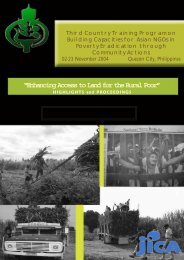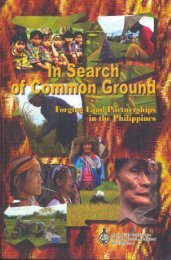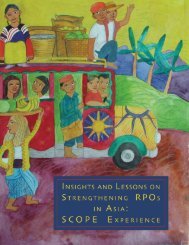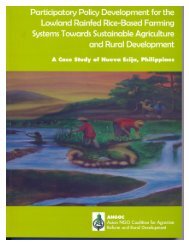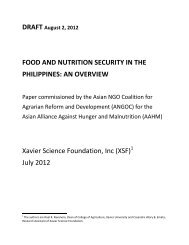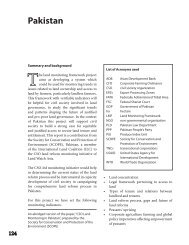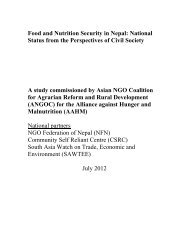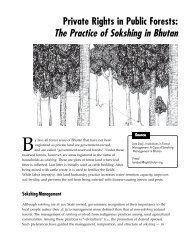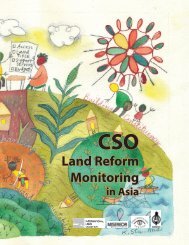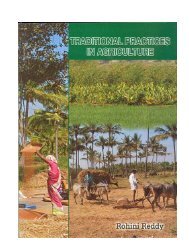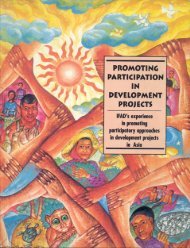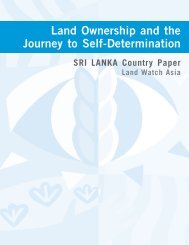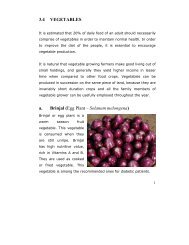Securing the Right to Land FULL - ANGOC
Securing the Right to Land FULL - ANGOC
Securing the Right to Land FULL - ANGOC
Create successful ePaper yourself
Turn your PDF publications into a flip-book with our unique Google optimized e-Paper software.
SECURING THE RIGHT TO LAND<br />
64<br />
bodia, compared <strong>to</strong> its neighbors, land speculation and <strong>the</strong> unregulated<br />
allocation of land concessions are putting increasing<br />
pressure on <strong>the</strong> land. The rising demand for land is also attributed<br />
<strong>to</strong> <strong>the</strong> privatization of public lands, mega-development<br />
projects, <strong>the</strong> establishment of Special Economic Zones (SEZs),<br />
land grabbing, and <strong>the</strong> allocation of land <strong>to</strong> <strong>the</strong> military. The<br />
price of land has skyrocketed, especially along <strong>the</strong> national<br />
borders, coastal areas, urban centers, and roads being rehabilitated.<br />
Settlers in Anlong Veng District, Oddar Meancheay province,<br />
near <strong>the</strong> Thai border, have reported that that <strong>the</strong> price of<br />
land along <strong>the</strong> main road <strong>to</strong> Thailand has tripled, in anticipation<br />
of <strong>the</strong> boom in <strong>to</strong>urism and business. As a result, land<br />
grabbing has run rampant throughout <strong>the</strong> country. The culprits<br />
are mostly military officials, businessmen, and politically<br />
influential persons. <strong>Land</strong> grabbing has become <strong>the</strong> main cause<br />
CASE STUDY #3<br />
No Poor People Allowed in<br />
Angkor Wat<br />
Within <strong>the</strong> Protected Cultural Zone of Angkor Wat reside<br />
families that have been living <strong>the</strong>re since <strong>the</strong><br />
1970s. Many members of this community were born <strong>the</strong>re,<br />
and make a living from farming, growing palm sugar and<br />
o<strong>the</strong>r crops, and doing o<strong>the</strong>r kinds of wage work. These families<br />
do not hold titles <strong>to</strong> <strong>the</strong> land because lands in protected<br />
zones are state property. However, local authorities had generally<br />
left <strong>the</strong> villagers alone, allowing <strong>the</strong>m <strong>to</strong> live and work<br />
in <strong>the</strong> area.<br />
In <strong>the</strong> year 2003, <strong>the</strong> APSARA Authority, <strong>the</strong> government<br />
agency tasked with overseeing Angkor Wat, started <strong>to</strong> impose<br />
restrictions on <strong>the</strong> activities of residents in <strong>the</strong> area. It<br />
listed <strong>the</strong> names of <strong>the</strong> villagers, <strong>to</strong>ok pictures of <strong>the</strong>ir houses,<br />
and forbade <strong>the</strong>m <strong>to</strong> make improvements on <strong>the</strong> latter, or <strong>to</strong><br />
build new ones. APSARA also prohibited <strong>the</strong> collection of firewood<br />
from <strong>the</strong> forest.<br />
These regulations have caused many problems for <strong>the</strong><br />
villagers. They could not repair <strong>the</strong>ir homes, when <strong>the</strong>se were<br />
destroyed by rain or s<strong>to</strong>rm. Newly married couples could not<br />
build a home for <strong>the</strong>ir family. As a result, homes have become<br />
overcrowded; a number of families have left <strong>the</strong> area.<br />
It has also become harder <strong>to</strong> make a living, given <strong>the</strong> restrictions.<br />
In contrast, rich people continue <strong>to</strong> build new and bigger<br />
homes in Angkor Wat, while <strong>the</strong> APSARA turns a blind eye.<br />
of land dispossession in both urban and rural areas in Cambodia.<br />
These property <strong>the</strong>fts are made easier because local people<br />
rarely have titles <strong>to</strong> <strong>the</strong>ir land.<br />
<strong>Land</strong> speculation is <strong>the</strong> main motivation behind <strong>the</strong> recent barrage<br />
of applications for Economic <strong>Land</strong> Concessions (ELCs). In<br />
2004, some 2.4 million hectares of land were allocated as ELCs,<br />
and many of <strong>the</strong>se cover areas that are beyond <strong>the</strong> ceiling set<br />
by <strong>the</strong> ELC sub-decree of 2005. ELCs are held by concessionaires<br />
for as long as 99 years, during which time <strong>the</strong> land would<br />
have appreciated in value many times over. This might explain<br />
why many ELCs, which cover huge tracts of land, are not immediately<br />
put <strong>to</strong> productive use by concessionaires; <strong>the</strong>y are<br />
eventually sub-leased <strong>to</strong> o<strong>the</strong>r companies or <strong>to</strong> subsistence cultiva<strong>to</strong>rs.<br />
Unfortunately, <strong>the</strong> indiscriminate awarding of ELCs has taken<br />
away large agricultural areas from many small farmers. At <strong>the</strong><br />
same time, what should have been productive land goes unused<br />
for a period of time after <strong>the</strong> concessionaire gets hold of it.<br />
Poor <strong>Land</strong> Governance<br />
Governance of <strong>the</strong> country is generally marred by shrinking<br />
democratic space, lack of <strong>the</strong> rule of law, legal impunity, lack of<br />
transparency, incompetence, corruption, a judicial system that<br />
cannot assert its independence of <strong>the</strong> executive, and <strong>the</strong> ruling<br />
political party that is more concerned with consolidating its<br />
power ra<strong>the</strong>r than governing well.<br />
In regard <strong>to</strong> land governance, Cambodia has performed as badly.<br />
The Cadastral Commission, which was set up in 2002 as a dispute<br />
resolution mechanism, is plagued with bureaucracy and<br />
corruption. The NGO Statement on <strong>the</strong> Moni<strong>to</strong>ring of CG Indica<strong>to</strong>rs,<br />
issued in June 2006, noted <strong>the</strong> Commission’s general<br />
weakness and lack of resources. It reported that while <strong>the</strong> Commission<br />
has improved its ability <strong>to</strong> address small conflicts, “it is<br />
not very successful in addressing more complicated cases that<br />
involve powerful people because of <strong>the</strong> pressure and threats it<br />
[is subjected <strong>to</strong>] when dealing with such cases.”<br />
Elin Enge, of <strong>the</strong> NPA Oslo <strong>Land</strong> and Resource <strong>Right</strong>s Advisor,<br />
observed that “land registration leads <strong>to</strong> speculative investment<br />
and more and better land being held by <strong>the</strong> elite.” <strong>Land</strong> redistribution<br />
is not a priority of <strong>the</strong> government and leading international<br />
organizations. To benefit <strong>the</strong> poor and marginalized<br />
people, land registration needs <strong>to</strong> be participa<strong>to</strong>ry and should



